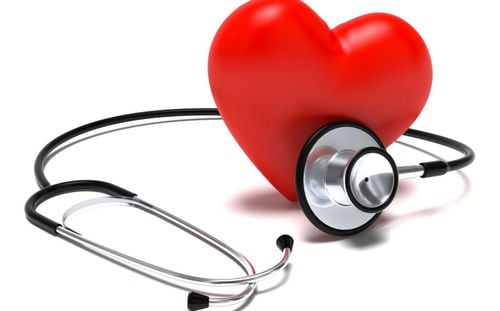This is an automatically translated article.
Heart surgery is a major surgery so care for patients after heart surgery should be focused. What should patients eat after heart surgery and after heart valve surgery is a common question. Knowing how to properly care for patients after heart surgery will help the recovery process faster.
1. Diet after heart surgery
Patients after heart surgery often spend a lot of energy. What to eat after heart valve surgery to recover quickly is the question of many patients and family members. Caring for patients after heart surgery should note the following diet:
A nutritious diet is very important for the recovery of health after surgery. Patients should eat lean meat, beef, fish, fruits, whole grains, olive oil, soybean oil and peanut oil. Do not drink alcohol, smoke, pipe tobacco and stimulants. Avoid eating animal fat, butter, coconut oil and palm oil, fast foods because they contain a lot of saturated fat, which is bad for the heart. Reduce the amount of salt in the diet, to no more than 2g of salt per day. Avoid foods with a lot of salt such as bacon, smoked salmon, pickles, packaged chips... In addition, if taking antifreeze, the patient must follow a strict diet, Avoid eating a lot of dark green vegetables because it will interact with anticoagulants.

Chăm sóc bệnh nhân sau mổ tim cần phải chú ý thực hiện chế độ ăn lành mạnh, giàu dinh dưỡng
2. Things not to do after heart surgery
Patients should know what to abstain from heart surgery to avoid adverse health effects. Caring for patients after heart surgery should be concerned with both the physical health and the mental health of the patient.
In living and working habits Every movement in the first week after heart surgery requires the support of loved ones to avoid overexertion, including daily activities. It's important to break up and take steps to limit fatigue. If the patient feels tired, short of breath, or has chest pain, they must stop and rest immediately. If you work in an office, you can return to work after 6 weeks. If the work is more strenuous, it will require a longer recovery time. Some people may not be able to return to their previous jobs if the work is too strenuous. If open-heart surgery, while the sternum is healing, the patient should avoid lifting objects weighing more than 4.5kg or pulling and pushing activities by hand. The patient is allowed to shower, but bathing is only recommended after 4 to 6 weeks or until the wound is completely healed. Wash gently, do not rub the incision with soap. Do not use shower gel or cream until the incision is completely healed. Avoid driving a car 4 to 6 weeks after surgery because the reaction is still slow due to fatigue, weakness or medication and also avoid the risk of collision causing sternum injury. When driving, the patient should take a break every 1-2 hours to straighten the legs, improve circulation in the legs and avoid swelling of the legs. Do not cross your legs when sitting or lying down because this will put pressure on the veins below the knee and slow down the blood circulation. If the feet or legs are swollen, when sitting, you should raise your feet or rest your feet on a chair. Avoid straining muscles such as straining while defecating, pulling or pushing heavy objects, or raising your arms above your head as these work harder for the healing heart. Do not try to take the stairs or use the handrail on the railing and then try to lift yourself up. In the first few weeks, there should be a rest period twice in the morning and afternoon, after recovery, rest at least once a day. Elastic socks should be worn during the day and taken off at night to help blood circulation and reduce swelling in the feet. Wear it for at least 2 weeks after discharge or more if the leg is still swollen. Pay attention to any swelling or lumps in the chest incision area. If the discharge is unusual or doesn't go away after a few months, talk to your doctor. During the first week after discharge from the hospital, body temperature should be taken every morning. If your body temperature is above 38.5 degrees Celsius for more than 1 day or if you are shivering, tell your doctor. For the first 2 weeks, you should check your weight every morning. If you suddenly gain weight, tell your doctor right away.

Chăm sóc bệnh nhân sau mổ tim cần quan tâm cả về sức khỏe thể chất lẫn sức khỏe tinh thần của người bệnh.
If you are in the hospital, do light exercise such as walking in the room or in the hallway. Patients should not exert themselves to walk if they feel tired and in great pain. Then gradually increase strength through each day. A few weeks after surgery, most patients can walk 3 to 4 km a day.
Sex Sex takes a lot of energy, so it usually takes 1-3 weeks after discharge for the body to recover. After heart valve surgery, there are two factors that greatly affect sex life: physical health and mental health (emotional control disorder, anxiety, depression). Therefore, the patient should only initiate sexual activity when ready. However, patients should avoid excessive exertion as well as avoid strong impacts on the chest. Normally, after 8 weeks of heart surgery, the sternum has healed, the patient can have sex again.
Psychological comfort Patients should be psychologically comfortable, happy and optimistic. Avoid things that cause you to think a lot, have a negative impact on your psyche, and avoid stress. Relatives should talk more, create a happy atmosphere to help patients control their emotions well.
Medications After heart surgery such as valve replacement surgery, patients need to take anticoagulants regularly to prevent thrombosis due to artificial heart valves. Anticoagulants such as Sintrom or Coumadin... should be monitored regularly by testing prothrombin time and normalized INR. Patients need to take the medicine regularly, at the right dose, at the right time and avoid eating dark green vegetables because it will interact with the drug and reduce its effectiveness. If the patient has percutaneous coronary intervention or coronary artery bypass surgery, an antiplatelet drug is indicated. These drugs have a risk of causing stomach bleeding, so patients should abstain from eating sour, spicy, hot, greasy foods that are harmful to the stomach. Patients need to follow the doctor's instructions, absolutely do not increase or decrease the dose or take more medicine without the consent of the doctor. Seek medical attention right away if you have symptoms of unusual bleeding such as black or red stools, vomiting blood or black discharge, nosebleeds that are difficult to stop, extensive bruising or lightheadedness, dizziness, severe headache, coma . Finally, patients need to have regular check-ups so that the doctor can check the medication regimen, dose, side effects of the drug and make necessary adjustments. If you have a need for consultation and examination at Vinmec Hospitals under the national health system, please book an appointment on the website (vinmec.com) for the best service.
Please dial HOTLINE for more information or register for an appointment HERE. Download MyVinmec app to make appointments faster and to manage your bookings easily.













